Nigiri Project Receives Battery Powered Award
We’re pleased to announce that California Trout will receive a $250,000 award in support of our Nigiri Project, which promotes a multi-benefit approach to water management in the Central Valley to support both native fish recovery and agriculture.
The award from Battery Powered, a program of The Battery Foundation, is one of several granted by the organization in support of a resource revolution “to transform California’s food, water and energy systems.” CalTrout was one of only three organizations to receive its full funding request from Battery Powered, which is funded by a private group of donors, many of whom are active in California’s cutting-edge technology industry.

Photo courtesy of Battery Powered
We are honored by this award from Battery Powered, which recognizes that fish and farms can and must coexist. This award will allow us to scale-up our efforts to recover the Central Valley’s native fish populations while also supporting agriculture.”
– Jacob Katz, PhD, CalTrout Central California Director
The Nigiri Project works with farmers to manage their fields as temporary floodplains to support the rapid growth of juvenile salmon, which increases the chances of the species’ long-term survival. Juvenile fish that are larger and healthier when they enter the ocean have better odds of returning as adults to reproduce.
For four consecutive winters, experiments conducted on Central Valley fields have documented the fastest growth of juvenile Chinook salmon ever recorded in California. The results suggest that through better planning and engineering, farm fields that produce agricultural crops in summer could also produce food and habitat for fish and wildlife during winter when crops are not grown.
“Our work shows that California can break out of the farms vs. fish mentality,” continued Katz. “When we get the most pop per drop of water from water used, fish and people both benefit.”
We will use the award funds to scale-up multi-benefit uses of Central Valley floodplains. The goal of the project is to make California’s water supply more secure for both people and fish by creating a water system that works with natural processes, instead of against them.
To see the Battery Powered presentations and learn more about the award, click here. For more about our work in the Central Valley click here.




